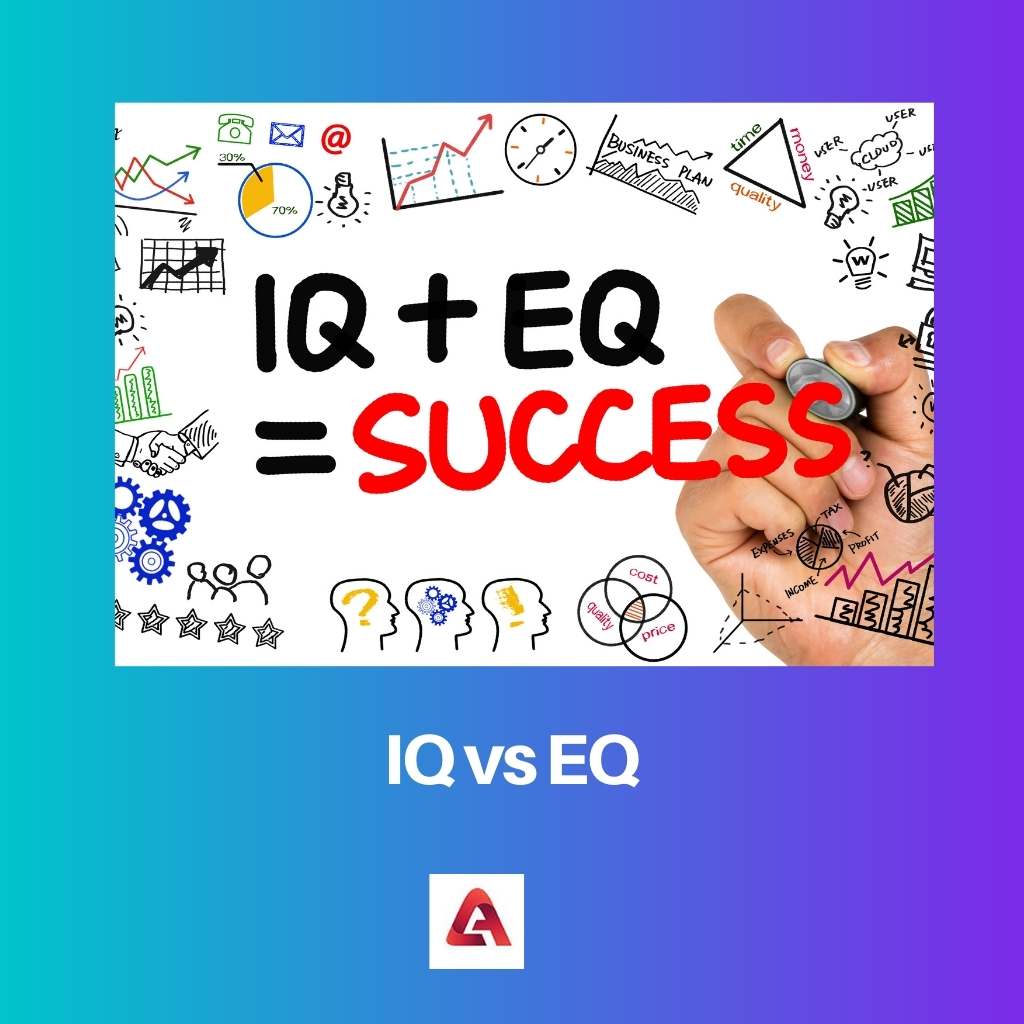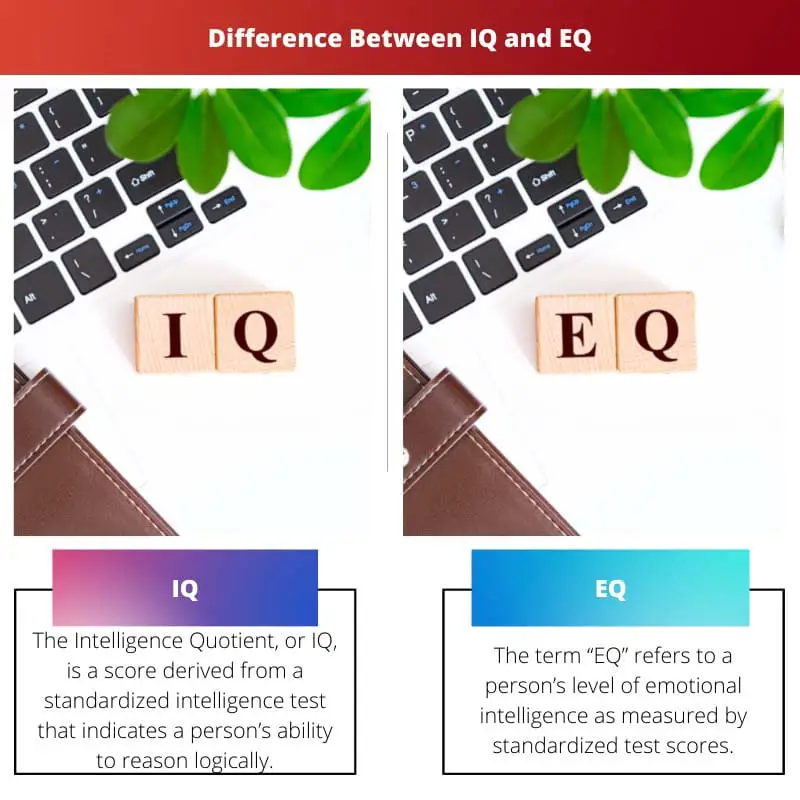The human mind is a wonder of complexity. Researchers and philosophers have been attempting to define it for ages. Researchers have used Intelligence Quotient (IQ) tests to determine what people know and how quickly they can solve issues using reasoning in the modern era. The notion of Emotional Intelligence (EI) has arisen as a means to represent another set of cognitive skills. IQ tests don’t necessarily predict success in school, life, or business.
Key Takeaways
- IQ (Intelligence Quotient) measures cognitive abilities, such as problem-solving, logical reasoning, and analytical skills.
- EQ (Emotional Quotient) measures emotional intelligence, including empathy, self-awareness, and interpersonal skills.
- IQ and EQ contribute to personal and professional success, but EQ plays a crucial role in social interactions and relationships.
IQ vs EQ
The difference between IQ and EQ is that the EQ, or Emotional Quotient, is a measure of a person’s capacity to comprehend his or her own emotions as well as the emotions of others, whereas IQ, or Cognitive Quotient, is a measure of a person’s intelligence level. Many people believe that IQ is more successful at work than EQ, but experts believe that people with high EQ are more successful in their careers.

The IQ Quotient is a standardized intelligence test result determined by dividing a person’s mental age by his chronological age and multiplying by 100. The test’s goal is to measure a person’s cognitive reasoning and thinking ability. The name was coined by William Stern, who was the first to use it. The results of an intelligence test are compared to the findings of other persons of the same age who took the same exam to determine a person’s intelligence level.
The phrase Emotional Quotient (EQ) is an acronym for the term Emotional Quotient, which is described as a person’s capacity to recognize his own and others’ emotions. It is a measurement of an individual’s emotional intelligence, which distinguishes between distinct feelings and uses this intelligence to guide thought and behaviour.
Comparison Table
| Parameters of Comparison | IQ | EQ |
|---|---|---|
| Definition | The Intelligence Quotient, or IQ, is a score derived from a standardized intelligence test that indicates a person’s ability to reason logically. | The term “EQ” refers to a person’s level of emotional intelligence as measured by standardized test scores. |
| Measures | General Intelligence | Emotional Intelligence |
| Ability | Learn, comprehend, and apply information, logical reasoning, and abstract reasoning. | Recognize, regulate, and express one’s own emotions, as well as sense and appraise the emotions of others. |
| Ensures | Success in school | Success in life |
| Acquisition | It is a natural talent. | It is a skill that can be learned and improved. |
What is IQ?
The intelligence quotient, or IQ, is a measurement of a person’s cognitive capacity. IQ is a statistic that is believed to measure how well a person can solve issues using knowledge and reasoning. IQ is commonly thought of as a measure of a person’s intelligence. An IQ test is used to determine a person’s IQ.
IQ tests measure both crystalline intelligence and fluid intelligence. Fluid intelligence is a person’s capacity to think, resolve issues, and grasp information, whereas crystallized intelligence is the knowledge and abilities we gain throughout our lives. The former is linked to learning and experience, and it becomes better as we get older. On the other hand, fluid intelligence is not dependent on learning and tends to deteriorate as we age.
It’s also worth noting because intelligence is an abstract term, and a tangible measure of intelligence is impossible to attain. IQ tests come in a variety of formats. They may include a number of subtests that assess memory, reasoning, arithmetic skills, and information processing speed. Qualified psychologists can also administer these exams. Academic placement (in college and university entrance examinations) and selection of candidates all involve IQ scores.

What is EQ?
An emotional quotient, or emotional intelligence, is a term used to describe a person’s emotional intelligence. It refers to our ability to recognize our own and others’ emotions, differentiate and name distinct feelings, use emotional information to guide cognition and conduct and change emotions to match different situations. In other words, emotional intelligence (EQ) is recognising, analysing, and managing emotions.
Emotional intelligence, according to academics, has four components: sensing emotions, reasoning with emotions, comprehending emotions, and controlling emotions. While some experts believe that EQ is a natural trait, others believe that it can be learned. EQ may also be measured using a variety of tests. Self-reported behavioural tendencies are the focus of the trait model.
Furthermore, it is the simplest to administer and score. It is a person’s capacity to recognize, express, and manage his or her thoughts and behaviours, comprehend and correctly interpret other people’s situations, make correct and timely decisions, cope with stresses and crises, and so on.

Main Differences Between IQ and EQ
- The Intelligence Quotient (IQ) is a standardized intelligence test result that assesses a person’s ability to think rationally. The term EQ refers to an individual’s level of emotional intelligence, which is indicated through test results.
- IQ measures General Intelligence, whereas EQ measures Emotional Intelligence.
- IQ has the ability to learn, comprehend, and apply information, logical reasoning, and abstract reasoning, whereas EQ has the ability to recognize, regulate, and express one’s own emotions.
- A person’s success in school is determined by his IQ level, but his success in real life is determined by his EQ level.
- The Emotional Quotient is learned and improved. In contrast, the intelligence quotient is a natural ability.

- https://onlinelibrary.wiley.com/doi/abs/10.1002/joe.21777
- https://www.sciencedirect.com/science/article/pii/S0191886912001705

Excellent article. The explanations about IQ and EQ are very clarifying and the differences between them are easily understandable.
The article is helpful in understanding both IQ and EQ along with their importance and how they can contribute to personal and professional success.
The explanations and comparisons added clarity to what IQ and EQ are, and what each measures. However, the article would be improved by including examples, as that might be helpful for better understanding.
The importance of IQ and EQ along with their definitions are very well defined. This article would help with people who are confused about the differences between these 2. It would be more helpful if the article also includes examples where IQ and EQ are used in real life situations.
The details about the differences in the ability measured by IQ and EQ are helpful. But, the article could be made even more informative by providing real-world examples of how these abilities impact people’s lives.
I found this article quite informative as it offers a clear comparison between IQ and EQ.
The article provides a thorough explanation of both IQ and EQ, their importance, and how they contribute to personal and professional life success. However, it would be greatly beneficial if the post also included the authors’ opinions and their conclusions on the topic.
This article has given a comprehensive understanding of both IQ and EQ. The references provided will be beneficial for those who want to further their knowledge on the subject.
I found the post to be quite enlightening. The comparison table between IQ and EQ is a useful visualization of the differences between the two.
This is a very informative post that clearly details out the differences between IQ and EQ. It is also great to see the references for those who want to dig deeper into the subject.